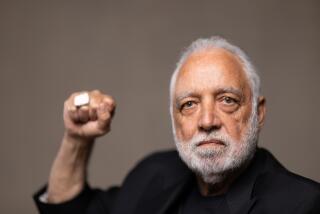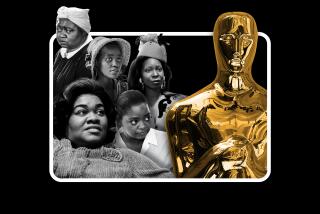Spirit of Brotherhood
- Share via
Before there was Martin Luther King Jr., there was A. Philip Randolph. A socialist and the publisher of the radical, Harlem-based magazine the Messenger, he championed black Pullman porters in their struggle to unionize, from 1925 to 1937.
In the 1920s, the Pullman Co., which operated the sleeping cars on trains across the country, was notoriously anti-union, and traditional trade unions such as the American Federation of Labor hadn’t invited black workers into its fold. Thanks to Randolph’s passion and perseverance, the first black union--the Brotherhood of Sleeping Car Porters--was created.
A new Showtime movie, “10,000 Black Men Named George,” premiering Sunday, dramatizes Randolph’s 12-year battle to form the union. Andre Braugher stars as Randolph, with Charles S. Dutton as Milton Webster, the union’s flamboyant, Chicago-based organizer; Mario Van Peebles as Ashley Totten, one of the founding members of the brotherhood, who nearly lost his life at the hands of Pullman Co. thugs; and veteran Brock Peters as a porter who once had been a slave. Robert Townsend (“Hollywood Shuffle”) directed.
Before the founding of the brotherhood, the porters not only were paid low wages but were sometimes humiliated and mistreated by white passengers. They even had their names stripped away: Each porter was called “George,” after the owner of the railway company, George Pullman.
Despite Randolph’s significance in the early civil rights movement in the 20th century, he has been nearly forgotten.
“I can’t tell you why he’s been forgotten,” Braugher says. “To me he was never learned. There are some things that are considered being American history and some things that are considered ethnic history. When you consider the mainstream of American historical thought, this is an incident rather than being the beginning, the seed, the kernel of something that is going to shape the scope of American society.”
Townsend’s great-grandfather was a Pullman porter. “I had no idea what they really went through,” the director says. And he didn’t know anything about Randolph’s history, other than that the name was familiar to him.
“See, as a kid, Martin Luther King represented the civil rights movement to me,” says Townsend. “When they said A. Philip Randolph is the one who taught Martin Luther King, that he was the real godfather of the civil rights movement, that is when I started to read up and do my research.”
The director applauds Showtime for embracing the project, “because, for me, I want to be able to say there are [African American heroes] out there other than Martin Luther King or Malcolm X or Jesse Jackson or Adam Clayton Powell. I think movies can educate and teach people, and with this particular story, I am really proud of it because it gives you a piece of history that no one else has ever told.”
The movie is the last project from executive producer Stan Margulies, of “Roots” and “Separate but Equal” fame. He died a year ago this week, a few weeks before the film went into production. Braugher, who is one of the executive producers, insisted Margulies receive credit on the film.
“We work in a very cutthroat business,” says Braugher. “When it came down to credits, I said there is no way that Stan Margulies--who conceived the idea of doing this piece, who executed it, who hired the writer [Cyrus Nowrasteh], who sold it in endless pitches--should go unrecognized.”
Margulies first approached Braugher about the project three years ago. “I remember being in Toronto and doing another piece and running into Stan there. When he first mentioned it to me, I had a vague idea who A. Philip Randolph was. It was an education for me going through the source material and some of the books about him and finding exactly where he came from, the course of his struggle and his compatriots in the formation of the union for Pullman porters and how much foundation they were for the subsequent civil rights movement.”
“10,000 Black Men Named George” can be seen Sunday at 8 p.m. and Wednesday at 8 p.m. on Showtime. The network has rated it TV-14 (may be unsuitable for children younger than 14).
More to Read
Only good movies
Get the Indie Focus newsletter, Mark Olsen's weekly guide to the world of cinema.
You may occasionally receive promotional content from the Los Angeles Times.











